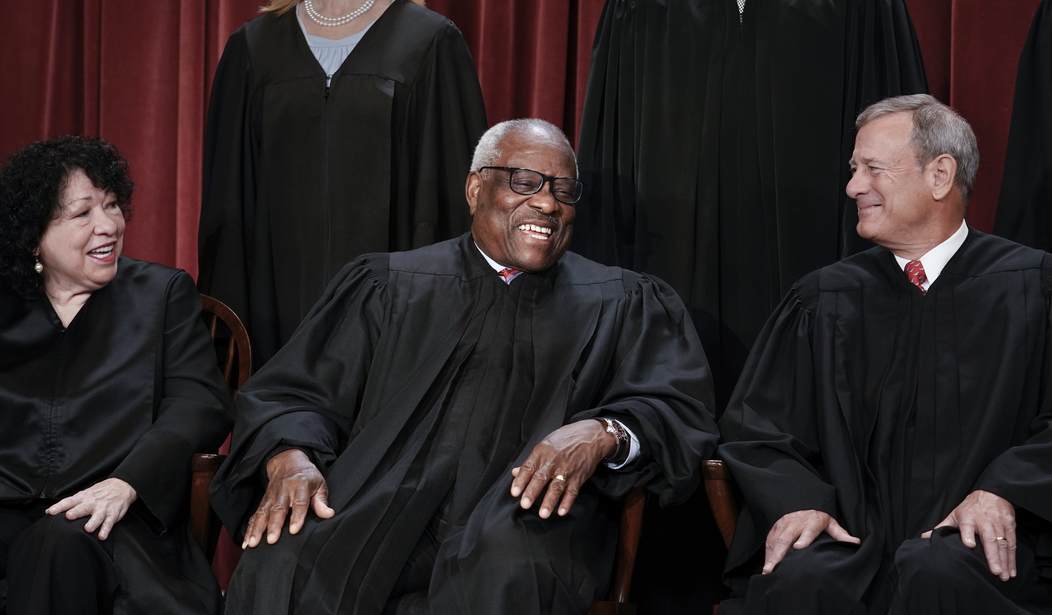Let's preface this discussion by reminding ourselves that predicting a Supreme Court decision based on oral arguments is usually a fool's errand. Justices often engage in Socratic-method questioning of the lead attorneys, challenging them to allow a better exposition of their arguments, and to cover gaps that may have appeared in the motions.
After spending my morning listening to the full two hours of argument, however, I do have one question. Will the decision to throw out Colorado's disqualification of Donald Trump be unanimous, 8-1, or 7-2?
Because the Socratic Method only goes so far in describing what took place this morning. Even before the hearing ended, the Associated Press issued a Breaking News alert that made clear that all of the justices sounded "broadly skeptical" of Colorado's arguments:
BREAKING: The Supreme Court sounds broadly skeptical of efforts to kick former President Trump off of the 2024 ballot. https://t.co/wDIo0vOpIO
— The Associated Press (@AP) February 8, 2024
Jason Murray, the attorney defending Colorado's use of the 14th Amendment to disqualify Trump as an insurrectionist, got into trouble almost immediately by avoiding pointed questions from the justices. That included Murray's former boss Neil Gorsuch, who demanded that Murray address his question or concede that he had no answer:
The attorney representing those trying to disqualify Trump, Jason Murray, clerked for Justice Gorsuch when Gorsuch was a federal judge in Colorado. But he was squirming under Gorsuch’s questioning.
Under the plaintiffs’ theory, Gorsuch said, jumping off a hypothetical from Justice Alito, once a president commits insurrection, can’t any military official just refuse to obey his or her orders?
Murray kept suggesting other ways to ask the question and Gorsuch kept coming back to it. “Please don’t change the hypothetical,” Gorsuch said at one point, adding that he understood if Murray had no good answer, saying, “We’ll move on.”
That's never a good sign, but justices Elena Kagan and Ketanji Brown Jackson at times sounded both skeptical and frustrated by Murray's arguments. Being the newest member of the court, Jackson went last and immediately took up an argument from Brett Kavanaugh. Suppose the authors of the 14th Amendment meant it to apply to the presidency. Why didn't they include it among the other offices specified in Section 3 without the qualifier of having held subordinate offices? Murray's answer didn't appear to impress Jackson, who expressed considerable skepticism that it should be inferred.
Kagan offered a broader argument for skepticism. By handing the power to individual states to make the DQ determination, Kagan argued, Colorado essentially would deprive voters in other states of the ability to impact the presidential election as they see fit. Later, Kagan (I believe) argued that issues such as these are national questions, and that the proper jurisdiction for national questions is the federal government -- either courts or Congress, not state courts.
Another point from Murray seemed to get a broadly unpopular response. Murray tried to counter that argument and others about the proper foundation of a conclusion that Trump engaged in insurrection by suggesting that the Supreme Court could make itself into the trier of fact -- in essence, a district court -- and that didn't please anyone.
The justices left an overall impression in this two-hour forum that they had no desire to allow that to happen, or to let states become triers of fact on 14th Amendment Section 3 disqualifications. That's not just my impression either, but also Kyle Cheney's at Politico:
The Supreme Court appeared to sharply veer against the Colorado voters challenging former President Donald Trump’s eligibility to run for office. ...
The odds seemed stacked against the challengers even before the hearing began, with legal experts anticipating hostility from the justices that cut across partisan lines. Thursday’s questioning seemed to confirm that view.
Not only were conservative justices sharply critical, the court’s liberal justices also worried aloud about the impact of the ruling.
“My question is why the framers would have designed a system that would — could — result in interim disuniformity in this way?" Justice Ketanji Brown Jackson said.
Chief Justice John Roberts cut to the heart of the problem in his questioning. The 14th Amendment limits state's rights, especially in the "insurrection" question after the Civil War. Its intent was to make that a question for Congress rather than the states so that former Confederate states could not send rebels back to Washington DC:
Chief Justice Roberts said that would essentially empower states to exert unilateral control over federal elections, a position “at war” with the notion that the 14th Amendment was meant to empower the federal government to constrain wayward states. pic.twitter.com/MS4tMvzDls
— POLITICO (@politico) February 8, 2024
I made this point a while back, too. The clear intent of the 13th, 14th, and 15th Amendments was to invoke federal authority over questions of slavery, citizenship, and discriminatory conduct and to supersede state power in all of these areas. It did the exact opposite of empowering states to determine eligibility for office and to settle matters of disqualification.
This brings me back to the first question. It seems clear that the court will throw out Colorado's DQ. And for now, it looks as though that decision will be unanimous. It also seems clear that the court doesn't want to rule on whether Trump committed an insurrection, an argument that none of them seemed eager to argue at all except to the extent of where and how it should be argued. I'd expect a 9-0 decision that precludes any more state-level DQs, and that's all. And since I'm placing bets, I'll put my meager cash down on Roberts writing the opinion, although I'm sure there will be parallel concurrences in part and/or in full.
Of course, don't forget about my admonition about fools' errands, either.









Join the conversation as a VIP Member